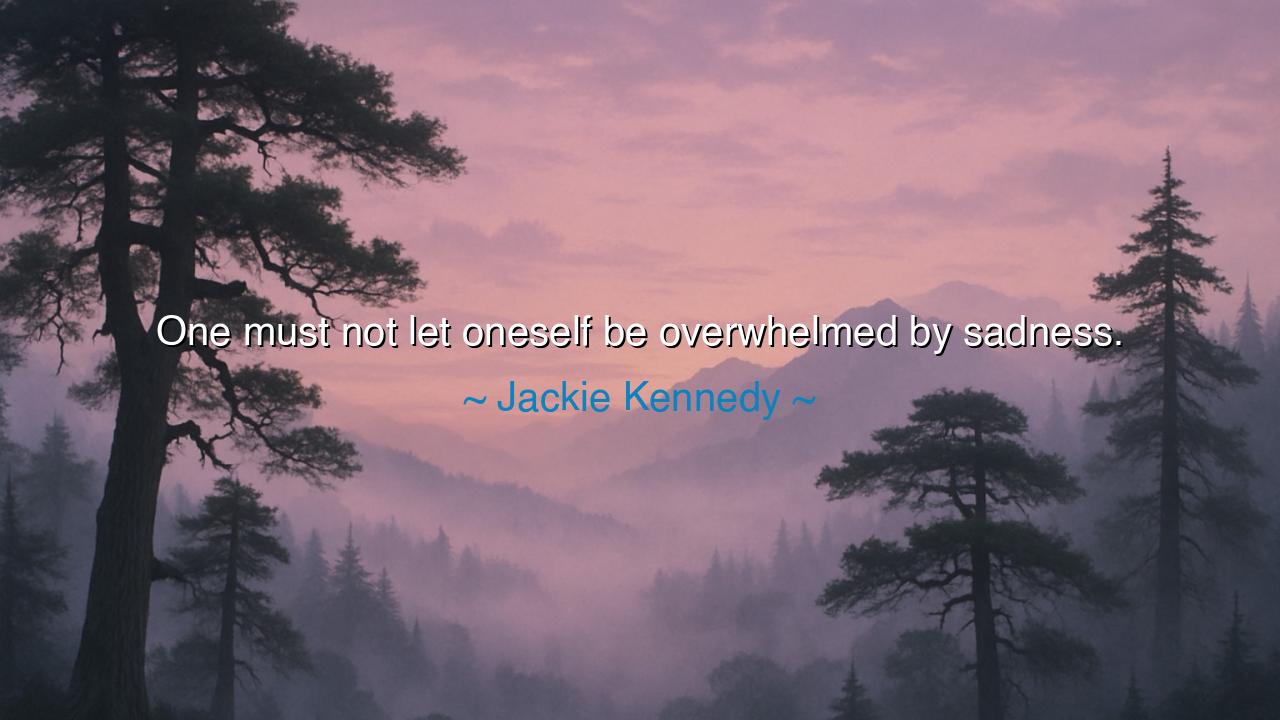
One must not let oneself be overwhelmed by sadness.






The elegant and steadfast Jackie Kennedy, whose life was marked by grace amid tragedy, once said: “One must not let oneself be overwhelmed by sadness.” In this brief but luminous statement lies the distilled wisdom of a woman who knew sorrow intimately yet refused to be consumed by it. Her words are not a denial of grief, but a call to endurance—a reminder that even when life descends into darkness, one must hold fast to dignity, strength, and the quiet light of hope. For to be overwhelmed by sadness is to surrender one’s will to live; but to rise in spite of it is to reclaim one’s humanity and power.
The origin of this quote is rooted in the personal experience of Jackie Kennedy herself, who endured immense suffering under the gaze of the entire world. As the wife of President John F. Kennedy, she stood at the heart of America’s Camelot, a symbol of poise and sophistication. Yet fate dealt her wounds few could bear: the loss of two children in infancy, and later, the assassination of her husband before her eyes. It was in the aftermath of that terrible November day in 1963 that Jackie’s strength became legend. Though her heart was torn, she carried herself with a composure that seemed almost superhuman. Her words—“One must not let oneself be overwhelmed by sadness”—emerged not as an abstract philosophy, but as the creed of a survivor who had chosen courage over collapse.
In her resolve, Jackie embodied an ancient truth: that sorrow is a sea that threatens to drown all who enter it, but it can also become a mirror of transformation for those who learn to float upon its waves. The ancients knew this well. When Odysseus wept upon the shores of his exile, the goddess Athena appeared to remind him that tears must one day give way to action. For while mourning honors the past, life demands that we continue forward. To let sorrow rule the heart is to become like a ship without a rudder—adrift, directionless, and doomed to sink beneath its own weight. But to stand, even trembling, is to affirm that the soul still lives and that destiny still awaits.
Jackie Kennedy’s life after tragedy reflected this truth. She devoted herself to her children, to art, and to history, restoring not only the White House but also her own spirit through purpose. She became a symbol of resilience, showing that while loss can scar the soul, it need not define it. Her sorrow never disappeared; it became part of her, deepening her humanity. But she refused to let it master her. In this, she became a living lesson: that grief must be faced, not fled—but neither should it be allowed to reign. True strength is not in avoiding sadness, but in ensuring that sadness does not consume the light within.
History gives us many who have faced such trials. Consider Abraham Lincoln, who carried the weight of a divided nation while haunted by his own melancholy. His life was a constant dialogue with despair, yet he turned his pain into compassion and his sorrow into resolve. Like Jackie Kennedy, he understood that sadness must not be allowed to crush the will, but rather tempered into wisdom. Both remind us that pain can either imprison or ennoble us, depending on whether we bow to it or stand beside it.
The lesson in Jackie’s words, then, is both tender and powerful: acknowledge your sadness, but do not worship it. Let it teach you empathy, but not paralysis. The heart may break, but it was made to mend. In moments of despair, look to what remains—love, memory, duty—and anchor yourself there. To resist being “overwhelmed” does not mean to deny feeling; it means to allow feeling without letting it devour your capacity for life.
And so, my child, when grief comes—as it surely will—remember the example of Jackie Kennedy. Stand with dignity, even as your tears fall. Carry your sorrow as one might carry a sacred vessel: with reverence, but also with strength. Do not let it drown the beauty still left to you. For the world continues to turn, and in its turning, it invites you to rise with it.
Thus, take to heart her immortal counsel: “One must not let oneself be overwhelmed by sadness.” To live by this is not to reject pain, but to master it. It is to walk through the valley of loss with head unbowed, knowing that even in mourning, the soul can shine. For the human spirit was not made to be broken—it was made to endure, to transform, and to begin again.






AAdministratorAdministrator
Welcome, honored guests. Please leave a comment, we will respond soon